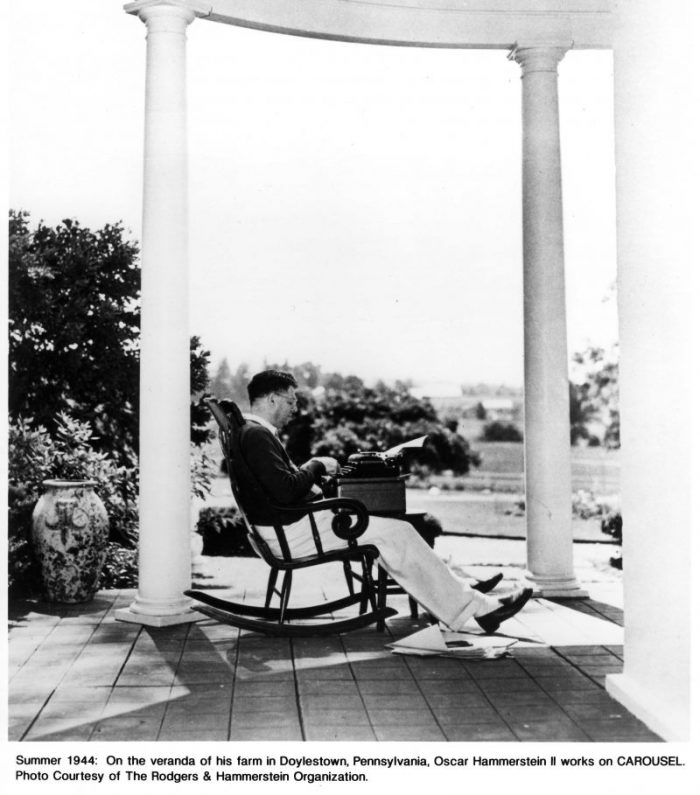
The transcendent talent of Oscar Hammerstein II was displayed in a one-night-only event June 23, 2018 at Bucks County Playhouse, near the farm where Hammerstein lived. This was a semi-staged concert version of Show Boat, the 1927 musical with book and lyrics by Hammerstein and music by Jerome Kern.
Every great accomplishment of Oscar Hammerstein was an outgrowth of what he pioneered in Show Boat. For examples, he wrote about racial prejudice and spousal abuse here, then returned to those topics in South Pacific, Carousel and The King and I. Show Boat also portrays alcoholism and gambling addiction. It’s a panorama of American history from just after the Civil War to the 1920s. Yet Show Boat is primarily a love story, and it has an abundance of humor.
As if that were not enough, Show Boat contains some of the best songs of all time, including “Why Do I Love You,”“Only Make Believe,” “Can’t Help Lovin’ Dat Man of Mine,” “Bill,” and “Ol’ Man River.”
All of that was revealed in this production with a strong cast of Broadway professionals under the musical direction of Andy Einhorn and stage direction of Josh Rhodes. Clocking at 2 hours and 45 minutes, nothing essential was cut, and time seemed to fly by. (Most of the editing was in the rambling Act II, and those cuts improved the flow.) One simple set sufficed, dominated by a picture of a river paddle boat. Theodore Chapin served as host, describing the changes of locale and the passage of time.
Time is an essential ingredient in this epic, of course, illustrated by “Ol’ Man River” which is sung recurrently, with changing lyrics, by the black dock hand Joe. This production included the word “nigger,” as did Oscar’s original script, illustrating the demeaning use of that word in that era. Joe was Michel Bell, who starred in Hal Prince’s great 1994 Broadway production. He still has that deep rolling bass sound and powerful high notes, which earned ovations with each repetition.
Other standouts were Laura Osnes as Magnolia, James Snyder as Gaylord Ravenal who sweeps her off her feet, Marcy Harriell as the mixed-race singer Julie, Lee Wilkof as Cap’n Andy, Jessica Walter as his wife Parthy, NaTasha Yvette Williams as Joe’s wife Queenie; and Clyde Alves and Stephanie Gibson as the song-and-dance team of Frank and Ellie. Each of them were spectacular in charisma, projection and vocalism.
Andy Einhorn’s piano replaced Show Boat’s orchestra and, after a few moments I barely noticed the loss because the large cast sang so well, and so robustly. Even this devotee of symphonic orchestras didn’t mind.
Two foreshadowing elements grabbed our attention. Magnolia and Gaylord fall in love at first sight here, just as Nellie and Emile will in South Pacific. And Magnolia remains devoted to Ravenal even when he treats her terribly, just as will the wives in Carousel and The King and I. Such loyalty in spite of cruelty is a strange aspect in Hammerstein’s writing.
This event reminded us of the beauty of Hammerstein’s lyric-writing. More surprisingly, it impressed us with the directness and communicativeness of his dialogue, considering that he wrote it ninety years ago. As for Kern’s music, we marvel at his cleverness in using the same melody for the serious “Ol’ Man River” and the catchy opening chorus “Cotton Blossom.” And how the tragic “Mis’ry’s Comin’ Aroun’” can wear the disguise of a happy tune when its tempo is changed. Thus a masterpiece is revealed to a new generation.
This production was part of the Oscar Hammerstein Festival at the Bucks County Playhouse under the direction of Alexander Fraser and Robyn Goodman. When the Playhouse opened in 1939, it was encouraged by Moss Hart, George S. Kaufman, Dorothy Parker and Pearl Buck. All of them resided nearby. One year later, Hammerstein moved to Bucks County with his family. The goal was to create an experimental theater that focused on new works. Fraser and Goodman are honoring those roots by taking proceeds from the Hammerstein Festival to fund new-play development and programs to educate children, and especially to encourage writers of lyrics.